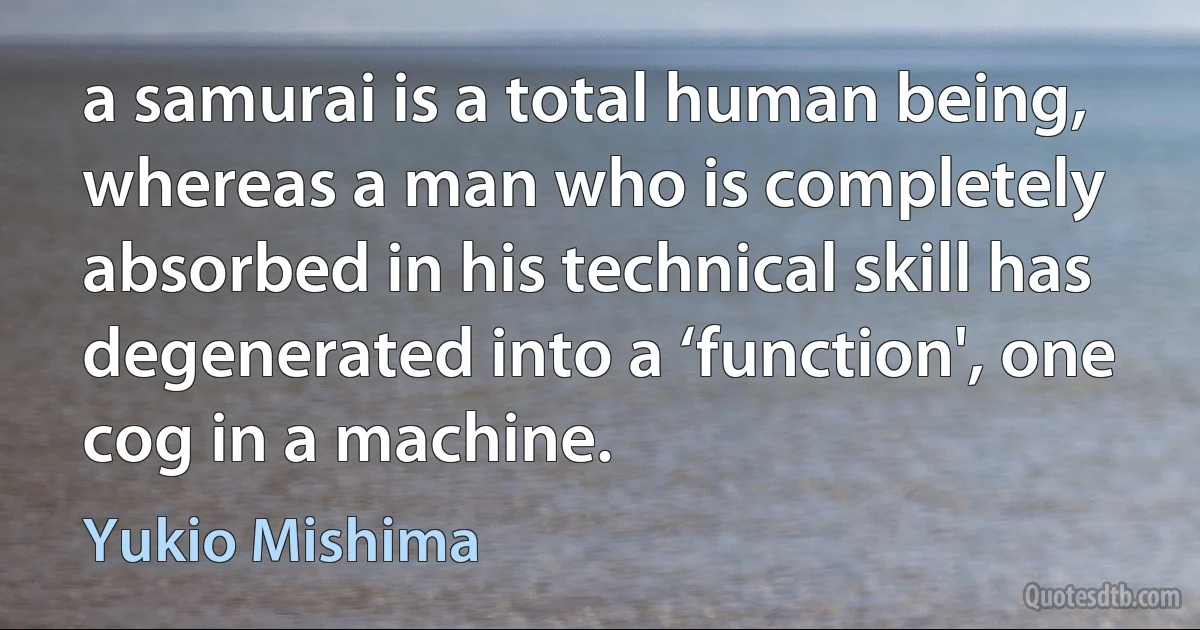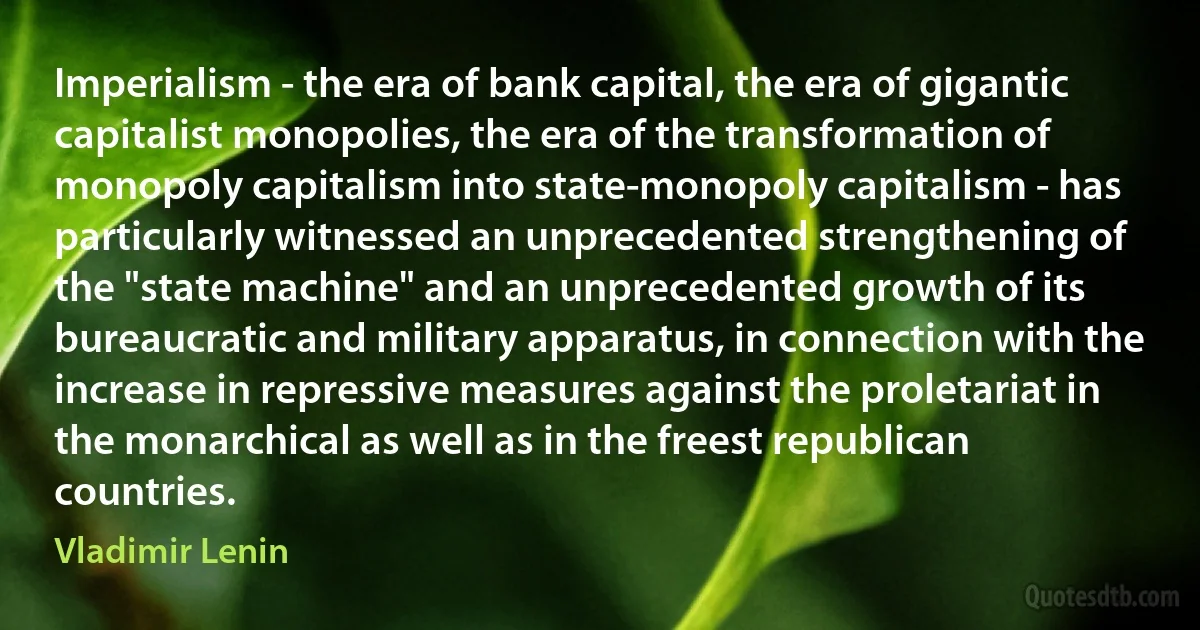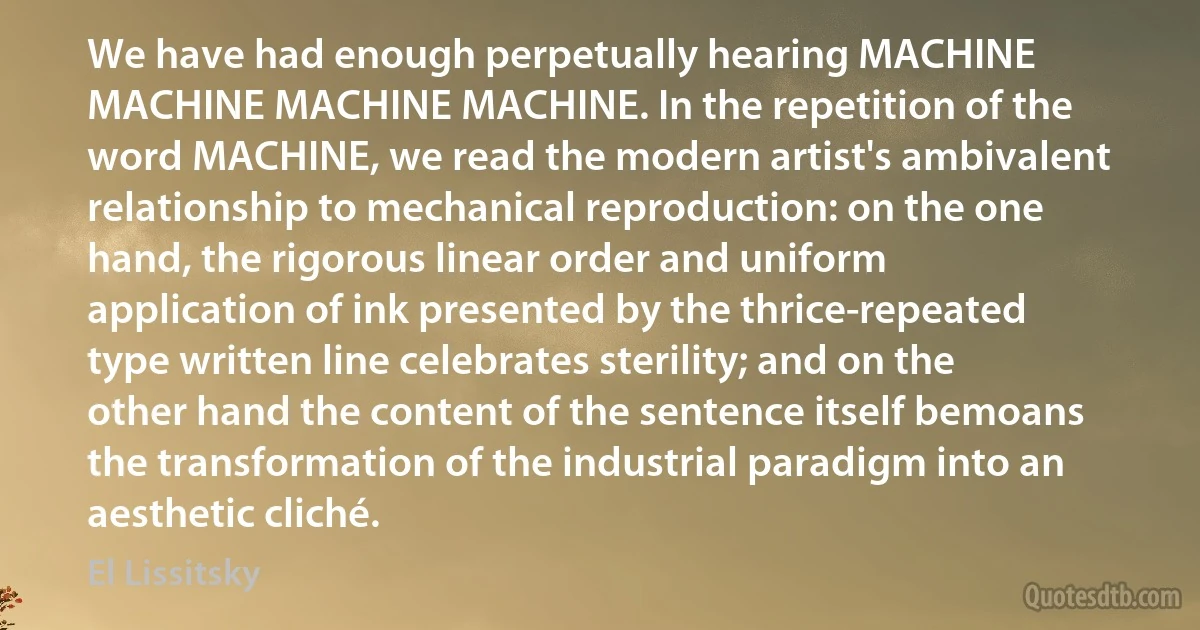Machine Quotes - page 12
The machine is a slave which serves to make other slaves. Such a domineering and enslaving drive may go together with the quest for human freedom. But it is difficult to liberate oneself by transferring slavery to other beings, men, animals, or machines; to rule over a population of machines subjecting the whole world means still to rule, and all rule implies acceptance of schemata of subjection.

Gilbert Simondon
For the man crucified on the crossed machine guns
Without name, without resurrection, without stars,
His dark head heavy with death and his flesh long sour
With the smell of his many prisons - John Smith, John Doe,
John Nobody - oh, crack your mind for his name!
Faceless as water, naked as the dust,
Dishonored as the earth the gas-shells poison
And barbarous with portent.
This is he.
This is the man they ate at the green table
Putting their gloves on ere they touched the meat.
This is the fruit of war, the fruit of peace,
The ripeness of invention, the new lamb,
The answer to the wisdom of the wise.
And still he hangs, and still he will not die
And still, on the steel city of our years
The light falls and the terrible blood streams down.

Stephen Vincent Benét
There's something wrong with democracy. If there weren't, it couldn't be overthrown by people like Makann, attacking it from within by democratic procedures. I don't think it's fundamentally unworkable. I think it just has a few of what engineers call bugs. It's not safe to run a defective machine till you learn the defects and remedy them.

H. Beam Piper
[...] Anyone who might think of attacking them would also probably recognize that they were armed. She smiled slightly; all three of them actually had valid concealed-carry permits for the Belgian FiveseveN specials under their jackets.
Although not for the P90 machine pistols in the attaché cases, and some of the stuff in the vehicle would be right out of it. Semtex, timers, detonators, cans of gasoline and thermite bombs, for example. Even if the invoice reads "Cleaning supplies" back at HQ.

S. M. Stirling
On-line service providers and others have a key role to play in freeing cyberspace of the taint of copyright lawlessness. Accountability for copyright violations committed by users is as essential for advancing this indispensable goal.
Who is responsible if a valuable copyrighted work is downloaded from a provider, and then copied on a digital video machine from which thousands of copies can be made, the last copy as pure and pristine as the first? And if no one can be held responsible, then who and what is to prevent the flood that will surely follow? This is a loophole larger than a parade of eight-wheelers through which a dam-busting avalanche of violations can rupture the purpose of your bill every day.

Jack Valenti
In the sea of people we are after all but a drop in the ocean, and we can administer only when we express correctly what the people are conscious of. Unless we do this the Communist Party will not lead the proletariat, the proletariat will not lead the masses, and the whole machine will collapse.

Vladimir Lenin
The Machine Age's commitment to cause and effect was the source of many dilemmas, including the one involving free will. At the turn of the century the American philosopher E. A. Singer, Jr., showed that science had, in effect, been cheating. It was using two different relationships but calling both cause and effect. He pointed out, for example, that acorns do not cause oaks because they are not sufficient, even though they are necessary, for oaks. An acorn thrown into the ocean, or planted in the desert or an Arctic ice cap does not yield an oak. To call the relationship between an acorn and an oak ‘probabilistic' or ‘non deterministic causality,' as many scientists did, was cheating because it is not possible to have a probability other than 1.0 associated with a cause; a cause completely determines its effect. Therefore, Singer chose to call this relationship ‘producer-product' and to differentiate it from cause-effect.

Russell L. Ackoff
Civil government does by its nature include much that is mechanical, and must be treated accordingly. We term it indeed, in ordinary language, the Machine of Society, and talk of it as the grand working wheel from which all private machines must derive, or to which they must adapt, their movements.

Thomas Carlyle
Thus we must carefully distinguish between two kinds of reality, one which has an individual character, and one which has a universal appearance... It is, however, wrong to think that the non-figurative artist finds impressions and emotions received from the outside useless, and regards it even as necessary to fight against them... It is equally wrong to think that the non-figurative artist creates through 'the pure intention of his mechanical process', that he makes 'calculated abstractions' and that he wish to 'suppress sentiment not only in himself but in the spectator'... It is thus clear that he has not become a mechanic, but that the progress of science, of technique, of machinery, of life as a whole, has only made him into a living machine, capable of realizing in a pure manner the essence of art.

Piet Mondrian
Spontaneous social action will be broken up over and over again by State intervention; no new seed will be able to fructify. Society will have to live for the State, man for the governmental machine. And as, after all, it is only a machine whose existence and maintenance depend on the vital supports around it, the State, after sucking out the very marrow of society, will be left bloodless, a skeleton, dead with that rusty death of machinery, more gruesome than the death of a living organism. Such was the lamentable fate of ancient civilisation. ... Already in the times of the Antonines (IInd Century), the State overbears society with its anti-vital supremacy. Society begins to be enslaved, to be unable to live except in the service of the State. The whole of life is bureaucratised. What results? The bureaucratisation of life brings about its absolute decay in all orders.

José Ortega y Gasset
To suppose that chemistry and poetry are incompatible (as I am sure Prof Donnan would not do!), or that biology is inconsistent with a religious outlook on the world (I don not say with theology!) is to misunderstand entirely what the human mind, by contemplation and experiment, has achieved. By extreme specialization at intervals, by overloading the machine to its limit, discoveries and progress are made: but their bearing is best seen by letting the engine idle and giving oneself time to look around. The chemist and the poet are both right, the biologist and the saint: and each must pull up now and then to find whither he is going and to adjust his spectacles.

Archibald Hill
These new means [in the modern film, 1920's] have given us a new mentality. We want to see clearly, we want to understand mechanisms, functions, motors, down to their subtlest details. Composite wholes are no longer enough for us – we want to feel and grasp the details of those wholes – and we realise that these details, these fragments, if seen in isolation, have a complete and particular life of their own.. .Close-ups in the cinema are a consecration of this new vision.. .A shoe as beautiful as a picture. A picture as beautiful as an X-ray machine.

Fernand Léger



